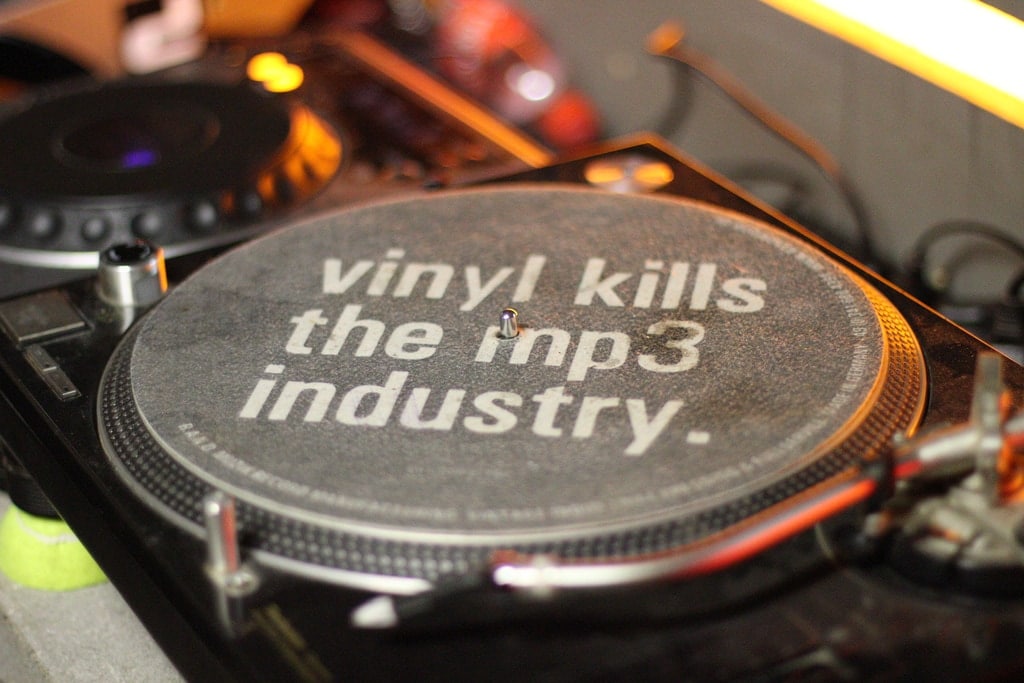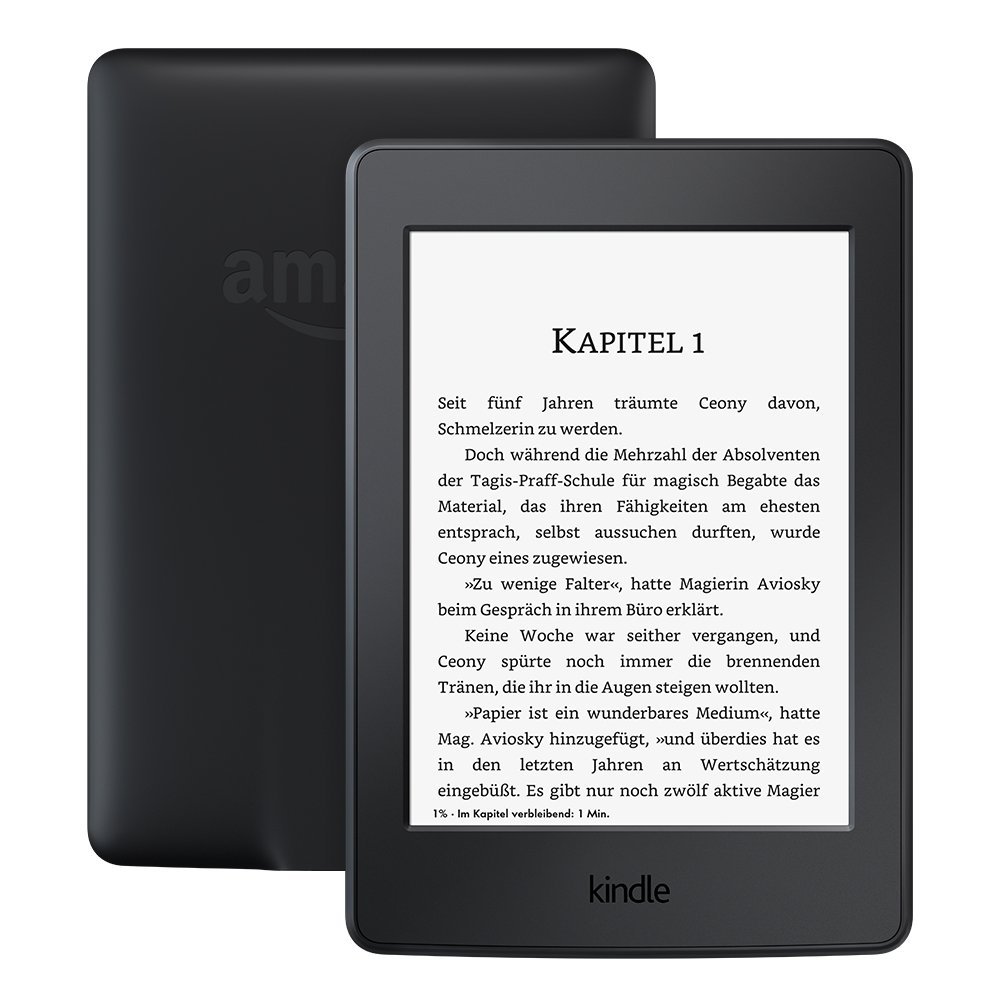Is Hardcover the new Vinyl?


The divide has been likened to diners who value the act of eating versus those who like the presentation of a meal, but now Literary Hub has a new take on this topic.
Yahdon Israel thinks that lovers of hardcover books have much in common with vinyl record enthusiast:
That same night I went to the Strand and asked, out of pettiness, if they had another copy of On Michael Jackson. I wasn’t expecting them to have it, but I wanted to prove that what had happened with my Nook would never happen again. If they did have it, I would own two copies of the same book. Much to my surprise, I was handed a copy of the book that looked nothing like mine. Suddenly, I began to understand what music lovers must feel like when, after spending hours digging through crates at hole-in-the-wall record stores, they finally locate that 12” vinyl they never thought they’d find: I need this.
Of course, you could buy a record like that on iTunes, or stream it on Pandora, Tidal or Spotify, but it’s a deeply satisfying experience to hold something in your hands that you actually went to look for. To know that few people will ever appreciate what you went through to get what you now have. That’s how I felt holding that first edition hardcover copy of Margo Jefferson’s On Michael Jackson. I need this. More than need, I deserve this. Of course it was true that the paperback had the same text, the same revelations on the inside—but sometimes what’s on the outside matters too.
It mattered to me that the hardcover’s sleeve was white with embossed silver lettering I could feel with my fingertips. It mattered to me that, if I wanted to, I could remove the sleeve and I’d still see the grooves of that lettering—not on the cover, but on the spine. And it especially mattered to me that this was a first edition. I may have been late to the party, but I hadn’t missed it altogether. …
He may be a luddite, but he does have a point.
Israel expresses concern for what might go wrong should he read on his smartphone as well as having been outfoxed by the security on a Nook, but he’s not wrong when he compares hardcover books and vinyl records.
Vinyl is to mp3s what hardcover is to ebooks. The content is fundamentally the same in each pairing, but it also differs in that the physical medium introduces imperfections not found in the digital copy (nor wanted, in most cases).
And Israel is also right in that some paper book loverswax rhapsodic in much the same way that vinyl enthusiasts talk about an original historic record.
But he is also wrong on the point that many true music lovers also build mp3 collections with multiple versions of the same song (original release, re-release, concert master, etc). So rather than being fixated on the physical, many music lovers are focused on the content.
And then there’s the simple fact that hardback books still have far more uses than simply presenting the content, Screens are still comparatively expensive and impractical when you want to display multiple books at once, so a paper book still has practical value.
His analogy is imperfect, and that’s a good thing. Israel sees paper books as having little value other than for their physical quirks, and if that opinion spreads then hardcover sales would drop precipitously.
Would you really want to live in a world where paper books were relegated to the niche hobbyist market the relative size of vinyl records?
According to Pitchfork, vinyl accounted for around $416 million in music industry revenue in 2015, out of an estimated $7 billion (according to the RIAA). That’s the highest it’s been since 1988, and the revival is largely being driven by marketing-driven nostalgia.
It would be terrible for us all if paper books were reduced to the same status; we would no longer be able to simply go online, and find any random book we wanted. Instead, we would have to accept whatever terms publishers offered and pay the prices they want for the ebooks they choose to put on the market.
And the world would be the poorer for it.
image by acidpix

Comments
Will O’Neil June 5, 2016 um 9:26 pm
If publishers would price e-books for economic return rather than for unearned rents e-book prices would plunge relative to paper, leading to increased e-book sales (and an overall expansion in the book market) and a contraction in paper sales. The big publishers use their remaining market power to slow this process, but at the price of seeing their market power undermined by independent author-publishers. Publishers fight back, relying largely on non-market mechanisms, but eventually they will lose. In a few decades the paper book will be a curiosity. Books overall will be a great deal cheaper and more of them will be bought and read.
Unless of coursed some new technology comes along to disrupt the process.
Will Entrekin June 6, 2016 um 10:17 am
Oh for sure. I’ve been seeing this idea floated around for a while now. I now read only digital — except for books I love, which I usually buy in hardcover (and signed) at ABEbooks. They go on my bookshelf.
I also agree about the content up to a certain point, mostly because I don’t think it’s necessarily the same with regard to music — because the better the equipment used for music, the better it often sounds. There are a lot of factors, from the medium (vinyl versus streaming versus digital) to the speakers (room versus headphones versus in-ear monitors). I haven’t seen that with relation to books — reading on a screen versus print might change the reading experience to some degree, but it doesn’t really change the story.
Nate Hoffelder June 7, 2016 um 8:41 am
Indeed. In fact, you can radically improve the listening experience with digital simply by doubling the bitrate and switching to slightly better headphones.
But with ebooks we’ve seen that changing to a higher resolution screen doesn’t necessarily improve anything. Switching to a customized font helps, yes, but when the Iriver Story HD had an HD screen and the Kindle did not, the latter still had the better reading experience.
Joseph Sanchez June 6, 2016 um 10:23 am
There is another significant difference between books and music: music does not require your full attention. I have music playing in my office all day on Spotify, but to engage with a book on screen or with a hardback requires the readers full attention and engagement. I think you could also argue that hardbacks are (or could) have tangible, quantifiable differences between them and their paperback or ebook counterparts. I own an 1893 embossed, gilt edition of Tennyson’s poems and the experience of reading his poems in that medium vs a paperback or newer hardback is radically different. What Israel is describing is something I call the "commodification effect" of digitization. We tend to treat objects that are nonphysical as commodities because they lack scarcity and are inherently fungible. Books have been experiencing this effect for a long time, digitization simply sped up the process. I describe the idea here: http://www.thebookmyfriend.com/boards-books-and-bytes/great-post-on-commodification-of-books
DavidW June 6, 2016 um 11:14 am
Hardcovers are not the new vinyl. Nope.
Vinyl quickly became marginalized in favor of cds. People were quick to dump them for a medium that was more compact, more convenient and offered better sound quality. As digital downloads kill the cd very slowly, vinyl has made a brief upsurge among trendy hipsters. The reality is that vinyl still has vanishingly small market share.
On the other hand hardcovers have been ubiquitous and have survived both paperbacks and ebooks. They still have a healthy market share and are going nowhere. They are still the choice for textbooks, libraries, collectors and new release runs.
Nate Hoffelder June 7, 2016 um 8:47 am
Yes, but only because publishers took over the paperback space and smothered it by raising prices. Then they did the same to ebooks.
So the long-term survival of hardbacks is less a difference between vinyl and hardbacks then it is a difference between book publishers and record labels.
Moriah Jovan June 7, 2016 um 9:15 am
Not true. For example, I have three different versions of “Summer of ’42” ALL by Percy Faith Orchestra (he did that a lot, so that’s only one representative song) because they’re in different keys and tempos. I have several mp3 versions of many songs by the same artist (acoustic, live, studio, remaster) because they all have different qualities I like. My favorite is “Morning Dance” by Spyro Gyra, a studio version and a live version. Then there are the ones from dead artists remastered with overtracks from new artists, not quite a cover, but close enough (Justin Timberlake with Michael Jackson, Natalie Cole with Nat King Cole, who was the first to do this—the tech to do that was a big deal at the time). THEN you have people who want the mp3s, vinyl, and CD.
That’s not accounting for the thousands of tracks I also have covers of, and in the classical realm—OMG. I have almost a dozen different performances each of CARMINA BURANA and MESSIAH, four of THE NUTCRACKER SUITE and various things by Rachmaninoff and Gershwin. Go to any of the more famous classical music listings in Amazon and you’ll find people arguing about whose version is the best, which sound system is best to play X on but don’t play is on Y, and be sure to get the better definition mp3s or if you can, get it on CD. There are people who have the mp3, vinyl, and CD and they play each regularly depending on what effect they want to evoke on which sound systems.
Call them collectors or whatnot, but *I* am not a collector by any means and I’m not the only one who simply likes variations.
Hardcovers as vinyl? Nope. Vinyl requires equipment and, moreover, a specific type of equipment that’s either cheap crap or too expensive for most people. A hardback book only needs eyeballs, light, and an ability to read. Its accessibility is usually the life of its owner if not hundreds of years with care.
I buy the hardcover (if available) of every book I read in E that I love (though not the paperback). Seeing it on my shelf reminds me what a lovely time I had reading it, where, and when. My bookshelves are like a scrapbook. I’m not a collector of hardbacks, either. SOME hardbacks of books I love are also beautiful books. (And that’s not to mention art/coffee table books.)
The analogy of vinyl to hardbacks is thin at best and not everyone eschews different formats in music and books.